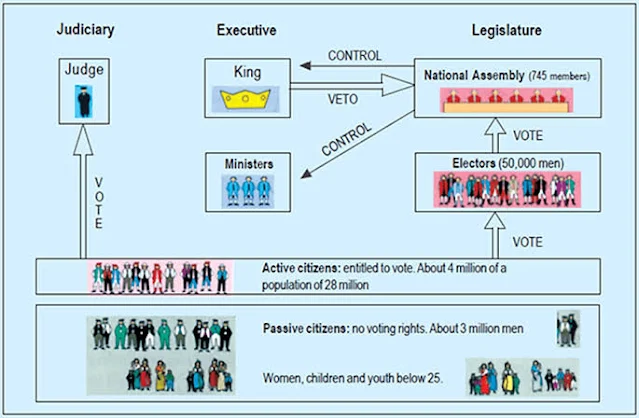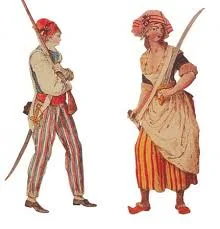The French Revolution
Chapter - 1
(Solutions)
Answer:- The circumstances leading to the
outbreak of revolutionary protest in France were:
Social Inequality: French society in the 18th century was divided into three estates namely The Clergy, The nobility and third estates. First two estates enjoyed certain privileges by birth. They were exempt from paying taxes. The Third estate comprises of businessmen, merchants, Peasants and artisans, labours had to pay taxes to the state.
Political Causes: Long years of war had drained the financial resources of France. France had a debt of more than 2 billion livres. To meet its regular expenses, the state was forced to increase taxes which angered the people.
Economic Problems: The population of France also increased from 23 million in 1715 to 28 million in 1789. Food grains were now in great demand. The price of bread shot up. Wages did not keep pace with rising prices. This led to subsistence crisis.
Strong Middle Class: A new educated and wealthy middle class emerged during the eighteenth century. They believed that no group in society should be given privileges by birth. Ideas of equality and freedom were put forward by philosophers.
Q. 2. Which groups of French society benefited from the revolution? Which groups were forced to relinquish power? Which sections of society would have been disappointed with the outcome of the revolution?
Answer:- It was the richer members of the third estate who mostly benefited from the French Revolution.
The clergy and the nobility were forced to relinquish (surrender) their power.
The poor class of third estate and women would have been disappointed with the outcome of the revolution as the promise of equality, discussed during the revolution was not given. The poorer classes had no right to vote.
Q. 3. Draw up a list of democratic rights we enjoy today whose origins could be traced to the French Revolution.
Answer:- We can trace the origin of the following democratic rights we enjoy today to the French revolution:
1. Right to Equality before law
2. Freedom of Speech and expression
3. Right against exploitation
4. Right to justice
Q. 4. Would you agree with the view that the message of universal rights was beset with contradictions? Explain.
Answer:- Yes, the message of universal rights was beset with contradictions. Though it says ‘Universal Rights’, women were unfortunately left out from the basic rights that were promised. They did not have equal rights that men enjoyed. They did not have the right to liberty, property, security and above all, the resistance to oppression. In the formulation of laws, women did not have any representation. Women were not entitled to all the honours and public employment, according to their abilities.
Answer:- After Robespierre's rule came to an end a directory was formed to avoid concentration of power in one individual. Members of the directory often fought among themselves leading to total chaos and political instability. This created a political vacuum in France. This was a conducive situation and Napoleon Bonaparte took the reign of power as a military dictator.
Napoleon saw his role as a moderniser of Europe. He introduced many laws such as the protection of private property and a uniform system of weights and measures provided by the decimal system.
Q. 6. What made France a Constitutional Monarchy?
Answer:- Louis XVI was forced to accord the recognition to the National Assembly. The National Assembly completed the draft of the constitution in 1791. It limited the powers of the monarch. These powers were now separated and assigned to different institutions viz. the legislature, executive, and judiciary. This made France a constitutional monarchy.
Social Inequality: French society in the 18th century was divided into three estates namely The Clergy, The nobility and third estates. First two estates enjoyed certain privileges by birth. They were exempt from paying taxes. The Third estate comprises of businessmen, merchants, Peasants and artisans, labours had to pay taxes to the state.
Political Causes: Long years of war had drained the financial resources of France. France had a debt of more than 2 billion livres. To meet its regular expenses, the state was forced to increase taxes which angered the people.
Economic Problems: The population of France also increased from 23 million in 1715 to 28 million in 1789. Food grains were now in great demand. The price of bread shot up. Wages did not keep pace with rising prices. This led to subsistence crisis.
Strong Middle Class: A new educated and wealthy middle class emerged during the eighteenth century. They believed that no group in society should be given privileges by birth. Ideas of equality and freedom were put forward by philosophers.
Q. 2. Which groups of French society benefited from the revolution? Which groups were forced to relinquish power? Which sections of society would have been disappointed with the outcome of the revolution?
Answer:- It was the richer members of the third estate who mostly benefited from the French Revolution.
The clergy and the nobility were forced to relinquish (surrender) their power.
The poor class of third estate and women would have been disappointed with the outcome of the revolution as the promise of equality, discussed during the revolution was not given. The poorer classes had no right to vote.
Q. 3. Draw up a list of democratic rights we enjoy today whose origins could be traced to the French Revolution.
Answer:- We can trace the origin of the following democratic rights we enjoy today to the French revolution:
1. Right to Equality before law
2. Freedom of Speech and expression
3. Right against exploitation
4. Right to justice
Q. 4. Would you agree with the view that the message of universal rights was beset with contradictions? Explain.
Answer:- Yes, the message of universal rights was beset with contradictions. Though it says ‘Universal Rights’, women were unfortunately left out from the basic rights that were promised. They did not have equal rights that men enjoyed. They did not have the right to liberty, property, security and above all, the resistance to oppression. In the formulation of laws, women did not have any representation. Women were not entitled to all the honours and public employment, according to their abilities.
Answer:- After Robespierre's rule came to an end a directory was formed to avoid concentration of power in one individual. Members of the directory often fought among themselves leading to total chaos and political instability. This created a political vacuum in France. This was a conducive situation and Napoleon Bonaparte took the reign of power as a military dictator.
Napoleon saw his role as a moderniser of Europe. He introduced many laws such as the protection of private property and a uniform system of weights and measures provided by the decimal system.
Q. 6. What made France a Constitutional Monarchy?
Answer:- Louis XVI was forced to accord the recognition to the National Assembly. The National Assembly completed the draft of the constitution in 1791. It limited the powers of the monarch. These powers were now separated and assigned to different institutions viz. the legislature, executive, and judiciary. This made France a constitutional monarchy.
 |
| The Political System under constitution of 1791 |
Answer:- The members of the Jacobin club belonged mainly to the less prosperous sections of society. Their leader was Maximilian Robespierre. Jacobins decided to start wearing long striped trousers similar to those worn by dock workers so as to set themselves apart from the fashionable sections of society, especially nobles, who wore knee breeches.
 |
| Sans-culottes couple |
Answer:- On 21 September 1792, the newly elected assembly called Convention abolished the monarchy and declared France a republic. Louis XVI was sentenced to death by court on the charge of treason. On 21 January 1793 he was executed publicly at the Place de la Concorde. The queen Marie Antoinette met with the same fate shortly after.
Answer:- The ideas of liberty and democratic rights were the most important legacy of the French Revolution. These spread from France to the rest of Europe during the nineteenth century, where feudal systems were abolished. It inspired the Germans, Italians, and Austrians to overthrow their oppressive regimes. The French Revolution inspired the struggling nations of Asia and Africa who were groaning under the oppression of European colonialism. Tipu Sultan and Rajaram Mohan Roy are two examples of individuals who responded to ideas coming from French revolution.



If you have any doubt, suggestion or question, feel free to contact us.